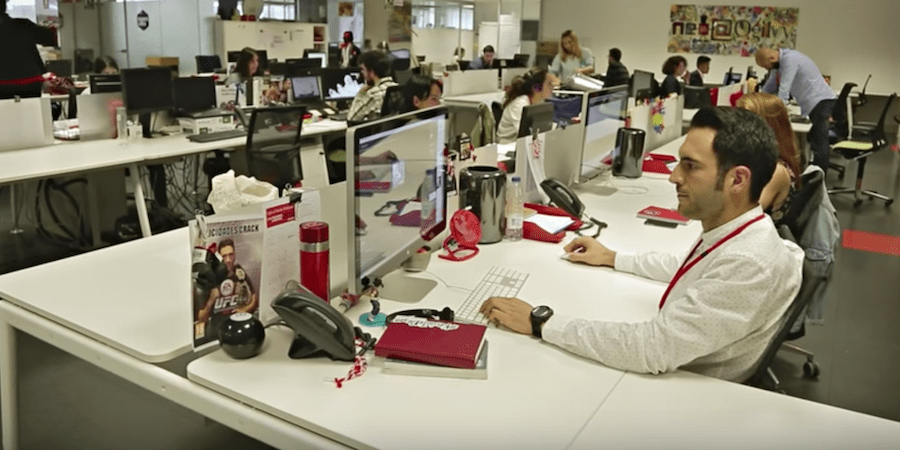
Le lean, c’est fantastique!
GETTING TO KNOW US – We sit for a chat with the President of Institut Lean France. Not only has ILF created a vibrant community of lean CEOs in France; it also launched one of the most innovative lean events out there.
Interviewee: Marie-Pia Ignace, President, Istitut Lean France
Planet Lean: Can you briefly take us through your career, please?
Marie-Pia Ignace: I got a diploma from the French military academy Ecole Polytechnique 30 years ago. There, I studied maths, mechanics, biology and lots of other scientific subjects. That’s also where I first got came into contact with management, which would become an important part of my career. I managed very large teams in a number of sectors (transport, bank, IT services) and really enjoyed doing that.
Because of my studies, I am also interested in translating innovation into real life – I am an entrepreneur (I created three companies) and an intrapreneur.
In 2004, BNP Paribas asked me to help them find a new way of run their operations. I loved bringing lean to the organization (at the time, people in the banking industry couldn’t even spell the word “lean”), as it was a unique opportunity to mix my interests in management and innovation.
As part of my efforts to lean out BNP Paribas, I joined the French lean community and gained the support of Michael Ballé. Step by step, Michael explained to me what lean meant in manufacturing and, step by step, I translated those ideas into a services setting. Today, 70,000 employees at BNP Paribas directly experience lean thinking on a daily basis and most senior leaders go to the gemba regularly.
In 2007, I created Operae Partners, a consulting firm specialized in lean transformations. A great team of agile thinkers joined me. Together, we translated lean ideas from manufacturing to IT.
At the same time, Dan Jones asked my community of lean practitioners if we’d be interested in creating a lean institute. We were, and that’s how not-for-profit Institut Lean France came to being. I became President six years ago.
PL: It would appear that ILF's approach entails developing a strong network of CEOs around France. Would you agree with this statement?
MPI: We have always known that lean cannot work without the support of CEOs or CXOs. A technical view of lean (a tools approach, let’s say) without a change in management culture leads to fleeting improvements and, in the worst cases, to more psychological pressure on employees.
At ILF, we have spent a considerable amount of time identifying lean CEOs (or transferring knowledge to CEOs until they understood and practiced lean) and creating platforms where they could come together and exchange experiences. We currently have in our network CEOs from sectors ranging from automotive to healthcare, as well as successful entrepreneurs – from 27-years-old startupers to retired executives.
PL: How do you facilitate knowledge transfer across France?
MPI: The lean leaders in our network regularly speak at our summits and share their experience with the wider lean community. Many of them have published articles here on Planet Lean as well!
We also organize more practical events all over France, as part of our Lean Tour. This is a way for local practitioners to share their experiences of lean thinking with a public of managers and operators. Institut Lean France is careful to select experiences of “real lean” and we are pleased to see communities of lean thinkers developing around the organizations participating in the Tour.
For us, this is also a way to identify people with lean talent, whom we then invite to join Institut Lean France to strengthen our expertise.
PL: What are the most interesting projects ILF is working on at the moment?
MPI: One of our most interesting projects we are running at the moment, in my opinion, aims to improve the way we create a common understanding of lean. We have created a place to reflect together as an organization last winter and we keep spending time there. Our first subject of reflection was lean as a strategy, and we are now moving to design and knowledge.
We have also started a lean green initiative. At the root of this was the discovery that Toyota made the protection of the planet one of its strategic goals. Our first Lean and Green conference took place in Paris at the end of 2017.
PL: One of ILF's biggest contributions to the lean community has been the creation of the Lean IT Summit. This has now been rebranded and it is moving away from Paris – why?
MPI: The first Lean IT Summit took place in 2011. At that time, IT people discovered that acceleration, quality, and value could only be accessible when coupled with an attempt to understand new ways of working.
I remember with both pride and embarrassment a comment Dan Jones made to me about one of the talks in the summit. An IT manager had finished explaining how he reduced the lead-time of a service delivery from 26 days to 1 day using flow, pull and the pursue of perfection. The audience was very impressed (delays are managed with difficulty in IT environments), but Dan kindly reminded me that the company had solved a “classic lean problem”, one that he had seen hundreds of times before in manufacturing.
Today, even though the IT problems of 2011 are still a plague in most organizations, there is a growing concern that is taking center stage: how to handle the transition to digital.
Typically, native digital companies are faster, more reliable and able to deliver much more value than their offline competitors. CIOs have to find ways to transform their organizations’ cultures and processes, and to do that quickly. They have big dreams of embracing agility, kanban, DevOps, UX, cloud, API, mobile, and so on, but have no chance of succeeding without the support of their teams. Lean is, in my opinion, a great way to help people control new processes and deliver in a better and faster way. This is why we decided to change the name of the Lean IT Summit into the Lean Digital Summit and to adapt our program to the industry’s changing situation.
This year, we are also organizing it outside of France for the first time. As an event run by Institut Lean France but organized within the Lean Global Network, the summit will be hosted by Lean Institute Portugal in Lisbon (thank you, Sérgio Caldeirinha). I see this as a great opportunity to grow our audience and meet new potential members of our community.
PL: What can you tell us about the state of lean in France?
MPI: In a way, we achieved our mission. Lean has now spread to every sector of the economy over the past 11 years. We also helped to bring lean to new fields in France: healthcare, engineering, IT, and green (among others). It is an interesting work in progress, a never-ending job. We wrote books to share our experiences, led masterclasses, and mobilized entire communities of practitioners.
On the other hand, we have the feeling that the more people talk about lean, the less they seem to understand it. For example, I keep meeting executives who tell me things like: “We do lean. We have visual management!” First of all, applying a few lean tools is not the same as embracing lean thinking (far from it). Secondly, effective visual management is more than a hundred post-it notes on a wall.
What this tells me is that the challenge for our Institute is changing. The “you should check out lean” period is over, and we now have to be more explicit in explaining the link between lean thinking and business success. (Arnaldo Camuffo, President of Italy’s Istituto Lean Management, is providing a lot of valuable information on this.) We also have access to our community of CEOs and a book on lean as a strategy. We have data, facts and stories… we now have to find a way to better leverage them to effectively community the potential of lean thinking.
THE INTERVIEWEE

Read more


FEATURE - What is the relationship between lean thinking and cost-cutting? Here's why you should focus on improvements as opposed to slashing a budget.


FEATURE – The continuous flow of developing people’s capabilities throughout their studies and careers is lacking, to say the least. It’s time we saw this as one big value chain.




FEATURE – With lean thinking, Madrid-based Neo@Ogilvy is hoping to create a stronger connection with customers, thus learning to create value for them and redefining the overall purpose of marketing.

